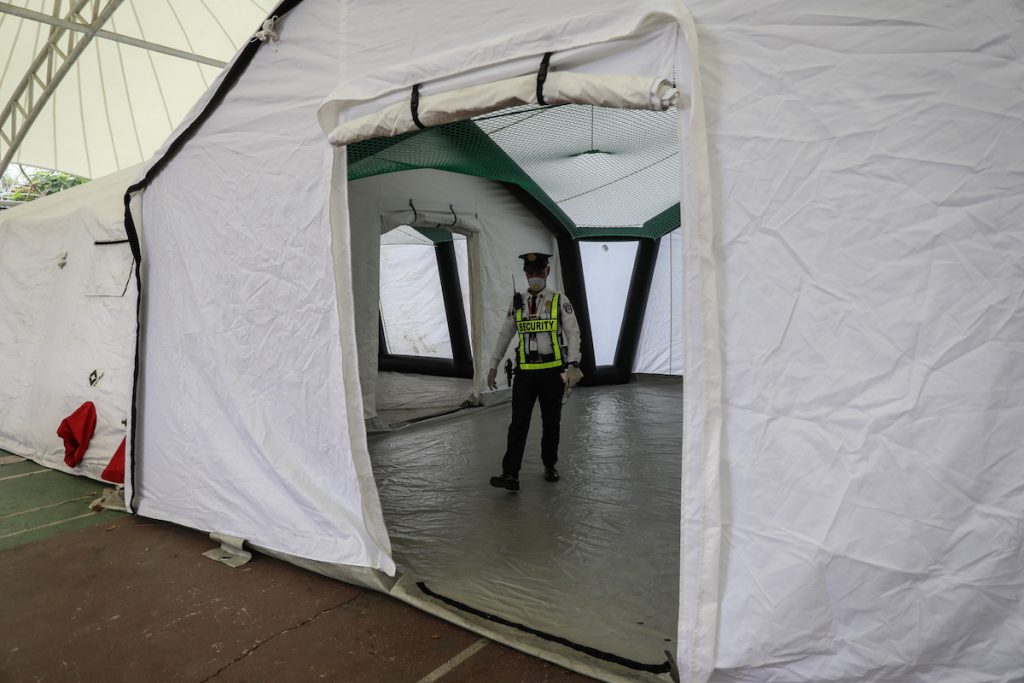Catholic bishops in the Philippines said church facilities, including schools and seminaries, may be converted into field hospitals if the health crisis in the country worsens.
As of March 24, at least five private hospitals in Manila have announced that they were no longer capable of accepting COVID-19 patients for confinement.
The hospitals said they have “already reached or exceeded its maximum capacity” and “our frontline healthcare workforce is already overstretched.”
Reports noted that more health professionals from these hospitals are already under quarantine due to exposure to patients with the new coronavirus disease.
Bishop Broderick Pabillo, apostolic administrator of Manila, said the archdiocese is “ready to take in [COVID-19] patients in our schools and churches as we are doing now to street dwellers.”
“We have space, but we do not have personnel. The hospitals and medical people should give the personnel and the know-how for this,” he said.
Bishop Jose Colin Bagaforo of Kidapawan said there is “no problem” if churches and public and private schools, gymnasiums, or any available idle buildings, would be needed.
“The problem is, do we have sufficient medical professionals to care for the sick? Can we provide them with enough protective equipment?” said Bishop Bagaforo who heads the Episcopal Commission on Social Action, Justice and Peace of the bishops’ conference.
He called on the government to immediately “enter into a contract with factories and manufacturers” to produce and prepare all necessary medical equipment “for the worst-case scenario.”
The Philippines has a total of 101,688-bed capacity in all 1,224 government and private hospitals in the country. Some 54,317 beds are in private hospitals.
Bishop Pablo Virgilio David of Kalookan told LiCAS.news that the Philippines has to start some serious planning in case the health situation worsens.
He said the Health Department should organize a think-tank or a central planning team to anticipate the overload of patients in hospitals.
The bishop said the government can temporarily take over hotels, motels, and resorts as quarantine sites, adding that these places have facilities ready.

Bishop David said he is willing to open churches and other church-owned institutions in the diocese to help the government.
He said, however, that the churches lack proper facilities for health care.
He said that if the government could supply the requirements needed, “I don’t see why we cannot make them function as quarantines and field hospitals.”
“Our churches were turned into field hospitals during the past wars when no other alternatives were [then] yet available,” said Bishop David.
He said retired doctors and nurses can also be enlisted to train volunteers and employed paramedics.
“Can they be given the technology to be able to work online from home while directing paramedics?” said the bishop.
Bishop Ruperto Santos of Balanga said his diocese can turn the seminary and the clergy retirement homes as temporary sanctuary for “patients under investigation” of COVID-19.
“We will designate our parish chapels to the field hospitals,” said Bishop Santos.
The prelate has earlier announced that members of the clergy in his diocese are foregoing their monthly allowances to help other people and their personnel during the crisis.
“It is our way of assisting them and helping them in this very troubling and trying times,” said the bishops, adding that it is the diocese’s way of showing solidarity to let the people “feel that our Church is always there for them.”
Bishop Gerardo Alminaza of San Carlos said that in time of crisis and emergency “the Church is compelled to put at the disposal of our affected brothers and sisters whatever we can offer.”
The prelate said it is not new for the Church to offer its facilities to victims of natural or human-induced calamities.
Bishop Alminaza, however, said protocols must be followed under the supervision of the Health Department.
On March 17, President Rodrigo Duterte placed the entire Luzon island, including the capital Manila, under “enhanced community quarantine” to quell the spread of the disease in the country.
As of March 24, the Philippines has 552 confirmed cases of COVID-19 with 33 deaths and 20 people who recovered from the disease.






